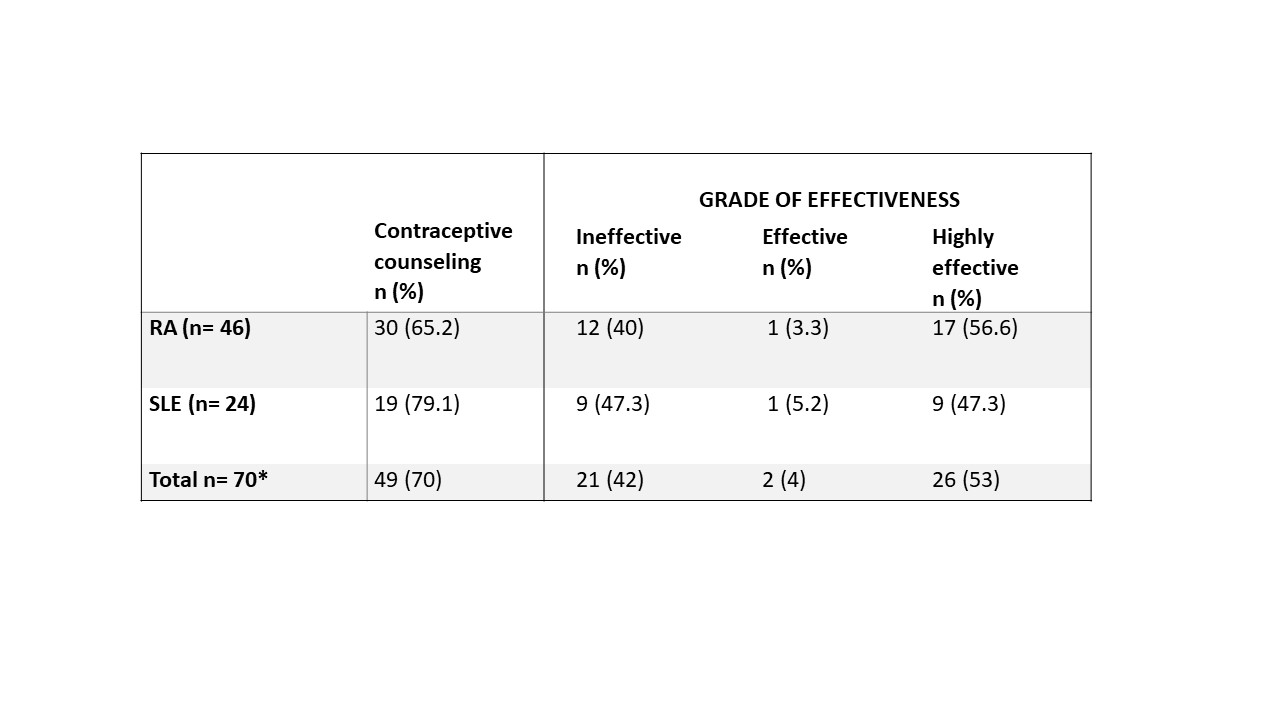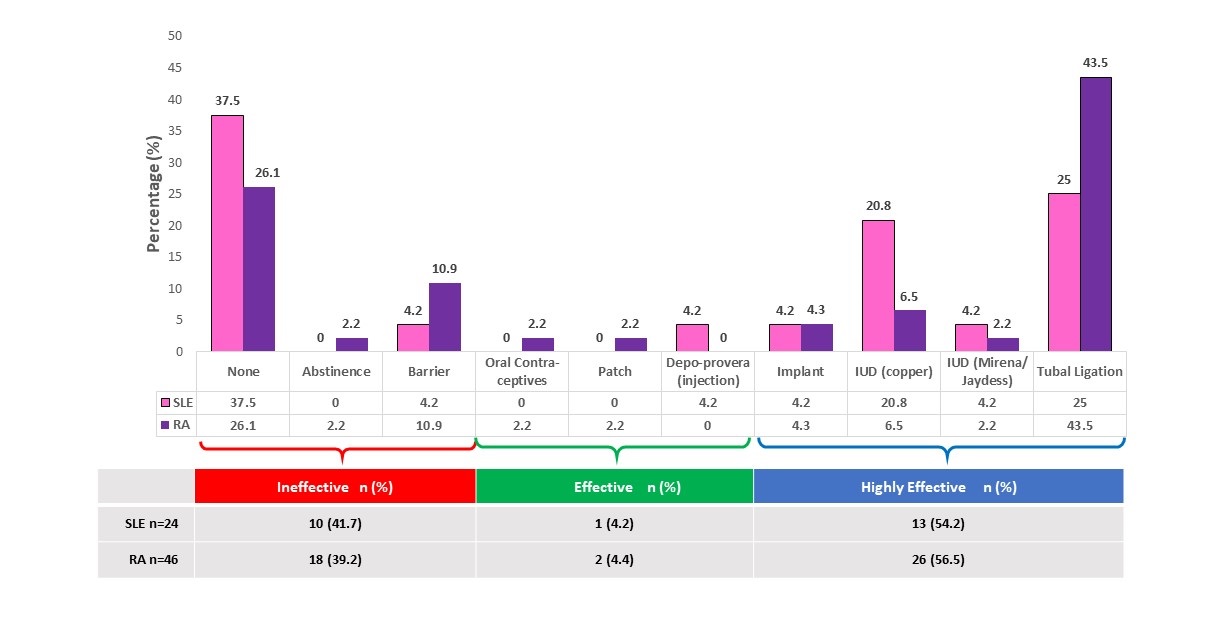Session Information
Session Type: Poster Session D
Session Time: 9:00AM-11:00AM
Background/Purpose: The importance of safe and effective contraception for women with rheumatic diseases has been increasing. Several studies have demonstrated that carefully planned pregnancies are related with better outcomes making the use of contraceptive methods (CM) more significant. The objective is to describe the use of methods of contraception among Rheumatoid Arthritis (RA) and Systemic Lupus Erythematosus (SLE).
Methods: A Cross-sectional study, where women aged 18-45 followed in our outpatient clinic of reproductive health, pregnancy and rheumatic diseases (CEER), at Monterrey, Mexico, were questioned about the use of CM. Sociodemographic data was collected from the medical record. CM were classified as Ineffective (10-25% pregnant each year), effective (6-9% pregnant each year) and highly effective (< 1% pregnant each year). Methotrexate, Mycophenolate, Cyclophosphamide, Thalidomide and Leflunomide were considered as teratogenic drugs. The statistical analysis was performed using SPSS 24.0. A p< 0.05 was taken to indicate statistical significance.
Results: A total of 91 patients were included, 35 (38.5%) SLE patients with a median age of 30 years (22-39) and 56 (61.5%) RA patients with a median age of 34.5 years (27.25-40). From the total population, 58 (63.7%) reported the use of teratogenic drugs, with a higher use in RA patients (p < .001). Socio-demographic characteristics are listed in Table 1.
Among the patients that had started sexual activity (SLE n=24, RA n=46), highly effective methods were the most frequent, used by a total of 39 (55.7%) women. The most common CM in RA was tubal ligation reported by 20 (43.5%) patients, nevertheless 9 (37.5%) SLE patients mentioned that they did not used any method. Graphs 1.
From the group who started sexual activity, 49 (70%) patients received contraceptive counseling, however, 21 (42%) patients were using ineffective CM. Table 2.
Conclusion: Only 70% of the women with rheumatic diseases received a contraceptive counseling and despite this 42% continued using an ineffective method. It is necessary to promote the counseling and use of contraception and provide a multidisciplinary support among this high-risk population.
 Table 1.Socio-demographic characteristics. RA: Rheumatoid Arthritis; SLE: Systemic Lupus Erythematosus. *Sexual activity in the last month.
Table 1.Socio-demographic characteristics. RA: Rheumatoid Arthritis; SLE: Systemic Lupus Erythematosus. *Sexual activity in the last month.
 Table 2. Methods according to effectiveness in patients who received contraception counseling. RA: Rheumatoid Arthritis; SLE: Systemic Lupus Erythematosus. * Total of patients that have started sexual activity.
Table 2. Methods according to effectiveness in patients who received contraception counseling. RA: Rheumatoid Arthritis; SLE: Systemic Lupus Erythematosus. * Total of patients that have started sexual activity.
 Graphs 1. Use of contraceptive methods among patients who had started sexual activity. This graphic shows the percentage (%) of contraceptive methods used by Rheumatoid Arthritis (RA) n= 46 and Systemic Lupus Erythematosus (SLE) n=24 patients, which are categorized by the grade of effectiveness. IUD: Intrauterine Device. Only were included patients that had started sexual activity.
Graphs 1. Use of contraceptive methods among patients who had started sexual activity. This graphic shows the percentage (%) of contraceptive methods used by Rheumatoid Arthritis (RA) n= 46 and Systemic Lupus Erythematosus (SLE) n=24 patients, which are categorized by the grade of effectiveness. IUD: Intrauterine Device. Only were included patients that had started sexual activity.
To cite this abstract in AMA style:
Diaz-Angulo J, Skinner-Taylor C, Perez-Barbosa L, Barriga-Maldonado E, Valdovinos M, Pineda-Sic R, Cardenas-de la Garza J, Figueroa-Parra G, Riega-Torres J, Galarza-Delgado D. Use of Contraceptive Methods in Mexican Women with Rheumatic Diseases [abstract]. Arthritis Rheumatol. 2020; 72 (suppl 10). https://acrabstracts.org/abstract/use-of-contraceptive-methods-in-mexican-women-with-rheumatic-diseases/. Accessed .« Back to ACR Convergence 2020
ACR Meeting Abstracts - https://acrabstracts.org/abstract/use-of-contraceptive-methods-in-mexican-women-with-rheumatic-diseases/
